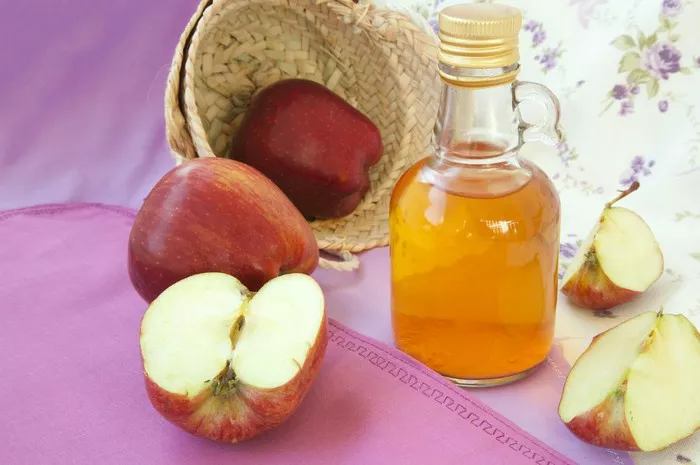Apple cider vinegar (ACV) isn’t just a kitchen staple; it’s an effective addition to your hair care regimen that can help with everything from dandruff to hair growth. With its unique acidic pH, ACV works wonders on the scalp and hair shaft, offering benefits like enhanced shine, reduced frizz, and even supporting optimal hair growth. In this article, we’ll explore the remarkable benefits of ACV for your hair, the best types of hair to use it on, and how to incorporate it into your routine.
Benefits of Apple Cider Vinegar for Hair and Scalp
ACV is packed with benefits that can transform your hair care routine. Here’s a breakdown of its primary advantages:
Neutralizes and Supports Scalp Biome: ACV helps balance the scalp’s natural pH and supports its microbiome. The antimicrobial properties of ACV help cleanse the scalp and keep bacteria and fungus at bay, reducing irritation, including conditions like dandruff or psoriasis.
Seals the Hair Cuticle: The acidic nature of ACV helps close the cuticle, locking in moisture and adding shine to your hair. This also helps improve color retention and reduces frizz, maintaining elasticity.
Supports Hair Growth: ACV can assist in hair growth by removing buildup from products like dry shampoo, which can clog follicles. This unblocks the scalp, creating a healthy environment for new hair to grow.
Treats Dandruff: ACV’s antibacterial and antifungal properties help combat the yeastlike fungus that contributes to dandruff. Whether you have dry or oily hair, ACV can be an effective remedy to reduce flakes and irritation.
Soothes Scalp Irritation: ACV is especially beneficial for people with scalp conditions such as psoriasis, offering a soothing effect due to its antibacterial and antifungal nature.
Which Hair Types Benefit the Most from Apple Cider Vinegar?
ACV works for nearly every hair type, but there are specific benefits for different textures and conditions:
Thick, Curly Hair: The smoothing and frizz-fighting properties of ACV make it a favorite for those with thick or curly hair.
Dry, Over-Processed, or Fine Hair: While ACV is generally safe, individuals with very dry, over-processed, or fine hair should exercise caution. The acidity of ACV might be too harsh for brittle hair that’s prone to breakage. If you have fragile strands, you should avoid applying ACV directly to the ends of your hair.
For best results, if you’re unsure whether ACV is suitable for your hair, do a strand test first to see how your hair reacts.
How Often Should You Use Apple Cider Vinegar on Your Hair?
The frequency of ACV usage depends on your hair type and scalp concerns:
Scalp Treatment: ACV can be used as a pre-shampoo treatment, massaged into the scalp for 10 to 15 minutes before shampooing.
Refreshing the Scalp: If you don’t shampoo every day, ACV can be used to refresh and balance the scalp on non-shampoo days.
Dandruff and Scalp Conditions: For persistent scalp issues, ACV rinses can be applied two to three times a week.
If you typically shampoo, try alternating between your regular shampoo routine and an ACV rinse to avoid overuse, as excessive application might dry out the scalp.
ACV vs. Clarifying Shampoos
Though both ACV and clarifying shampoos serve to remove product buildup, there are key differences:
Clarifying Shampoos: These often contain alkaline ingredients that remove oils and product buildup but can leave the scalp feeling dry and may fade color.
Apple Cider Vinegar: ACV not only removes buildup but also seals the hair cuticle, locking in moisture and providing added shine without stripping natural oils.
How to Use Apple Cider Vinegar for Hair
Making your own ACV rinse is simple and cost-effective. Here’s how you can do it:
Mix the Solution: Combine 1 part ACV with 2 parts distilled water (avoid tap water to prevent excessive acidity).
Apply After Washing: After shampooing and conditioning, blot your hair dry and apply the ACV mixture. Work it through your hair shaft using your hands.
Let it Settle: Clip your hair up and let the product sit for a few minutes.
Rinse: Finish with lukewarm or cold water to help close the hair cuticle and lock in moisture.
You can also find ready-made ACV products like shampoos and hair serums, but making your own solution allows for more control over the strength of the mixture based on your hair’s needs.
Conclusion
Apple cider vinegar is an incredibly versatile and effective addition to any hair care routine. From promoting hair growth to treating dandruff and soothing scalp irritation, the benefits of ACV are vast. Whether you have thick, curly hair or are dealing with scalp concerns, ACV offers a natural, affordable solution to enhance the health and appearance of your hair. Just remember to start slow, do a patch test, and always customize the use based on your specific hair needs.
Related topics:
- Schwarzkopf® Keratin Root Products Win 2025 Product of the Year USA Award
- Expert Reveals Essential Steps for Shiny Hair and Promoting Growth
- Tulsi: A Natural Solution for Stronger, Dandruff-Free Hair


